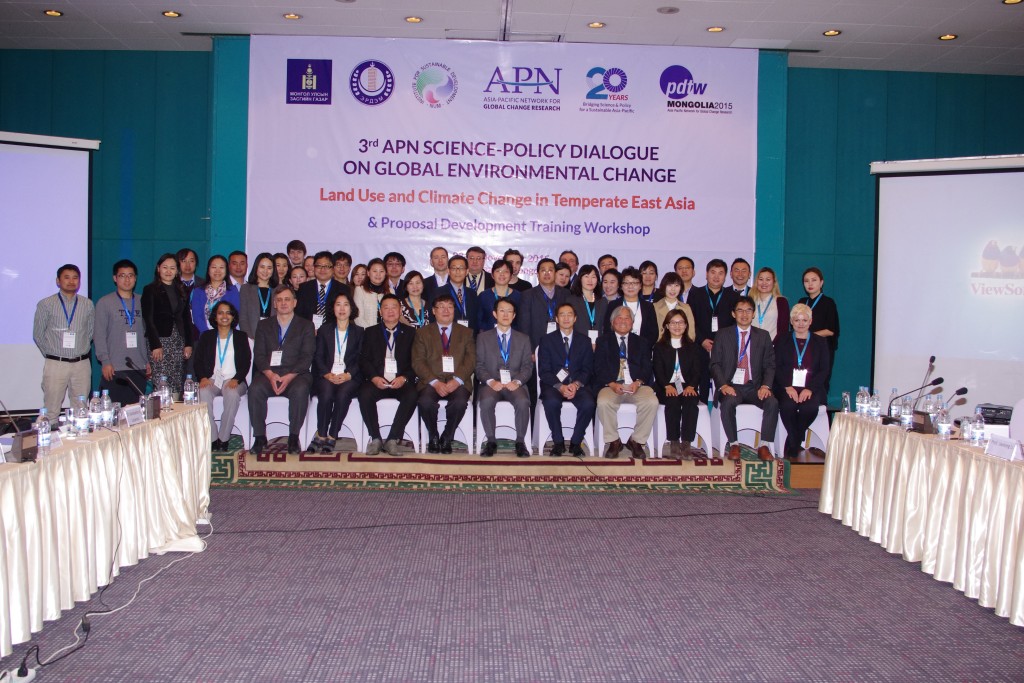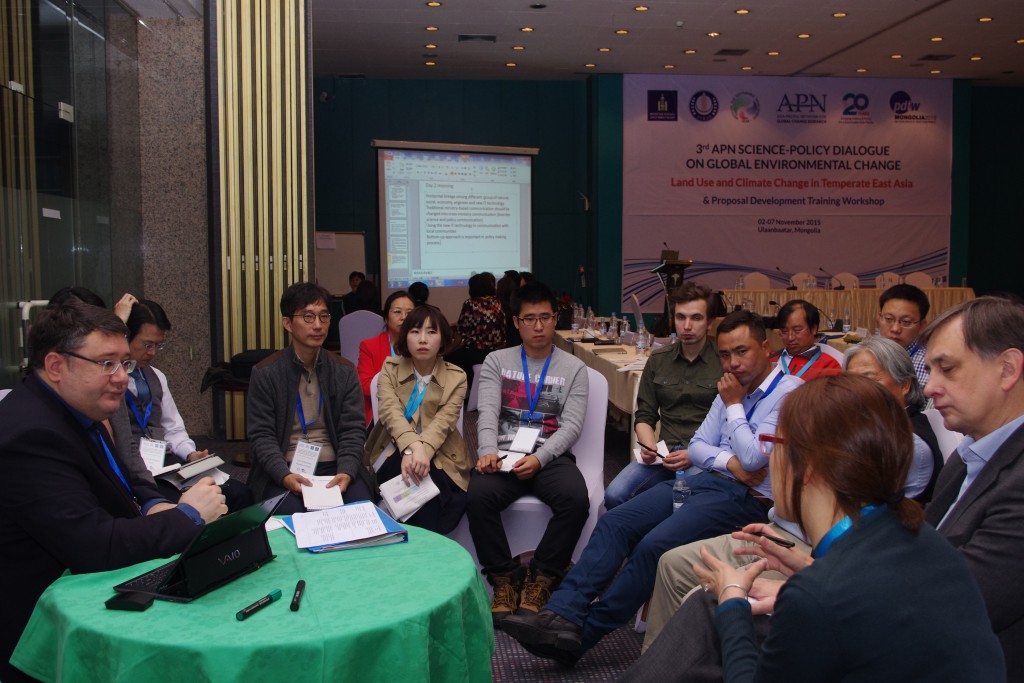Ulaanbaatar, Mongolia, from 02 to 04th November 2015 — Policy and decision makers from five Temperate East Asian countries, international experts on land-use and land-cover change (LULCC), media representatives, young scientists and local organisational representatives and experts from Mongolia joined APN’s third sub-regional Science-Policy Dialogue, an interaction-rich event jointly organised by the Mongolia Ministry of Environment, Green Development and Tourism, The Mongolian Academy of Sciences and Dryland Sustainability Institute, Mongolia.

Featuring “science-policy interface” as a hallmark of APN’s Science-Policy Dialogue series, the three-day event aims to provide a stimulating environment for participants to provide scientific input to policy- and decision-making — and to feed policy perspectives into scientific research — on issues related to various aspects of sustainable land use and land management, and its social, economic and ecological implications to countries in the region.
Government representatives from APN Temperate East Asian member countries of China, Japan, Mongolia, Republic of Korea and Russian Federation, and prominent scientists and researchers from within and outside the sub-region are among the participants of the Dialogue.
The discussion centres on enhancing research, policy tools and actions for sustainable land management at a time when, according to scientific studies, over fifty percent of the Earth’s ice-free land surface has been directly modified by human actions, resulting in indirect consequences that affect literally every corner of planet Earth. These consequences include contribution to greenhouse gas emissions, introduction of invasive species, impacts on natural water cycles, and the loss of biodiversity and ecosystem services, which will adversely impact Earth’s people, societies and organisms.
Mr. M. Khurelsukh, Vice Minister, Ministry of Environment, Green Development and Tourism, Mongolia noted in his welcome remarks that Mongolia needs a strong economic approach that leads to green development and Mongolia welcome collaboration with other countries in the region to achieve this.
Mr. Hiroshi Tsujihara, Director of the APN Secretariat, stated that APN has been supporting a number of research and activities in the area of land use changes including the Land Use Cover Change project, or LUCC, that was conducted by the global change programmes, IHDP and IGBP. The closer communications between the nFPs and the SPG Members through the formation of Sub-Regional Cooperation (SRCs) Committees has helped to achieve an encouraging trend and, in fact, this is one of the main reasons why we are able to convene this important science-policy dialogue this week.
Dr. Dennis S. Ojima from Colorado State University gave the key note speech at the dialogue. During the speech he noted that vulnerability to climate change is exacerbated by other stresses such as pollution, habitat fragmentation, and poverty. Solutions to multiple stresses requires assessment of these composite threats and evaluation of trade-offs of available options.

In three thematic sessions, the Dialogue covered land-use change and its impacts on biodiversity and ecosystem services, extreme events and land degradation in dry lands in the region, as well as sustainable land use practice for mitigation and adaptation. Three café kiosk sessions were conducted to share ideas and options for science-policy interfacing, knowledge management and communication on issues related to the aforementioned themes.
Specific topics in the rapid talk sessions by scientists and researchers include:
- Satellite-based monitoring of natural disasters in Mongolian socio-ecological system
- Sustainable land use practice in changing socio-economic conditions
- Dynamics and drivers of LULCC and environmental trade-offs for agricultural development in Russia
- Challenges in policy formulation and implementation in land-use change
- Problems of the Russian far east land use and marine environments
- Land use/cover change in semi-arid region of china and its impacts on regional climate
- Social-ecological systems and land-use change – linkages with SDGs, adaptation and mitigation plans
- Climate change, grassland degradation and adaptive management strategies of livestock production
- Innovative adaptation of pastoral systems in Mongolia.
Realising the important role of the media in strengthening the interlinkages between science and policy-making communities as well as the general public, APN has also invited media representatives to engage in the interactions as participants and to share their thoughts through daily wrap-up talks.
Following the conclusion of the Science-Policy Dialogue, a Proposal Development Training Workshop (PDTW) will be held to capacitate young scientists in the sub-region to better prepare for and develop competitive and well-designed research proposals to address their needs for resources and international cooperation in their research.
NOTE TO EDITORS:
The Asia-Pacific Network for Global Change Research (APN) is a network of 22 Member Country governments that promotes global change research in the region, increases developing country involvement in that research, and strengthens interactions between the science community and policy makers.
APN was established in 1996 and its Secretariat is based in Kobe, Japan. APN supports its member countries via annual open calls for research and capacity development proposals under its core programmes and frameworks, and by organising events such as science-policy dialogues and proposal development training workshops to engage the participation of scientists and policy makers in achieving its science and policy agendas.
| APN website: | www.apn-gcr.org |
| APN E-Lib (for APN funded projects information and Publications): | www.apn-gcr.org/resources |
| List of APN projects with Mongolian involvement: | http://goo.gl/CVMTNh |
| More information on Science Policy dialogue | https://www.apn-gcr.org/?p=9319 |
| Logistic information | https://www.apn-gcr.org/pdtw/2015/logistics.php |
| APN logo: | https://www.apn-gcr.org/download-apn-logo/ |
For the Proceeding and Policy Brief
For more information, please contact:
- Linda Anne Stevenson, Head, Division of Communication and Scientific Affairs, APN Secretariat, email: [email protected]
- Taniya Koswatta, Coordinator, APN Secretariat, email: [email protected]
- Bayarbat Dashzeveg, Head, Unit for Soil Protection & Combat to Desertification, National Committee to Soil Protection and Combat Desertification Ministry of Environment, Green Development and Tourism email: [email protected]
- Chuluun Togtokh, Dryland Sustainability Institute (DSI) email: [email protected]